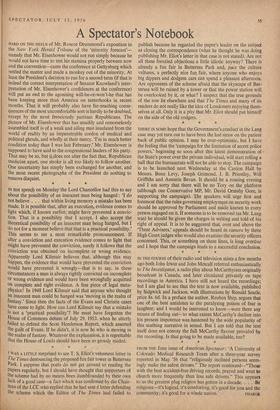IN HIS speech on Monday the Lord Chancellor had this
to say about the possibility of an innocent man being hanged : 'I do not believe . . . that within living memory a mistake has been made. It is possible that, after an execution, evidence comes to light which, if known earlier, might have prevented a convic- tion. That is a possibility that I accept. I also accept the theoretical possibility of an innocent man being hanged, but I do not for a moment believe that that is a practical possibility.' This seems to me a most remarkable pronouncement. If after a conviction and execution evidence comes to light that might have prevented the conviction, surely it follows that the conviction was obtained on incomplete or wrong evidence. Apparently Lord Kilmuir believes that, although this may happen, the evidence that would have prevented the conviction would have prevented it wrongly—that is to say, in these circumstances a man is always rightly convicted on incomplete Or wrong evidence and would have been wrongfully acquitted on complete and right evidence. A fine piece of legal meta- physics! In 1948 Lord Kilmuir said that anyone who thought an innocent man could be hanged was 'moving in the realm of fantasy.' Since then the facts of the Evans and Christie cases have come to light. How can Lord Kilmuir say that a mistake Is not a 'practical possibility'? He must have forgotten the House of Commons debate of July 29, 1953, when he utterly failed to defend the Scott Henderson Report, which asserted the guilt of Evans. If he didn't, it is now he who is moving in the realm of fantasy. Whatever the explanation, it is regrettable that the House of Lords should have been so grossly misled.


































 Previous page
Previous page